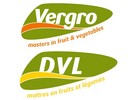Vergro and its subsidiary, DVL, have a new building in Sint-Katelijne-Waver, Belgium. It’s now finished and in full use. “The warehouse covers 8,000 m2 and has 16 loading bays. It’s fully conditioned at 12°C. We also have four cold stores to cool products at even lower temperatures,” says Vergro’s Dominiek Noppe.
“By cooling the entire warehouse, the products are never too warm. This benefits their quality. We now have far more space to do our work properly. We can work much more efficiently, but also far safer. Thirty to 40% of the new warehouse is built for growth. And we have an option on land adjacent to the building. So, for now, we can continue to expand.”
Vergro’s new warehouse design also considered sustainability. “We’ve installed an ammonia cooling system. This is currently the most sustainable cooling system. The building is insulated to the highest standards too. There’s a space above the ceiling over the building’s entire width. You can walk in there. That provides double insulation,” says Dominiek.
“There’s solar glazing and LED lighting. And solar panels on the roof for full capacity. We thought about the offices too. We heat these with recouped heat from the warehouse. The new site has another advantage. We have 30% less internal transport. That’s significantly reduced CO2 emissions.”
DVL
“We’re a stone’s throw from the auction house here. So DVL’s trucks can leave for customers in the south of France at 1 pm. DVL mainly delivers to wholesalers, who want their products delivered at 3 am. Summer is peak season. Then, about six trucks leave for the South every day. For these clients, price is less important than quality,” Dominiek continues.
“That’s why we work with the best Belgian and Dutch products. We also deal directly with growers. We carefully select those with the best quality. We have our own brand, Bianca, too. At present, we only carry chicory under this brand. But we want to expand it for other products as well.”
“Eureka fresh remains the Vergro group’s house brand. We want to keep investing in it. That’s along with loyal growers who brainstorm with us. Tomatoes, pears, apples, and leeks have been doing well under this brand. And the last few years, so have bell peppers and eggplants,” adds Noppe.
Brexit
Vergro has two more warehouses in Belgium. “Sint-Truiden is the largest at 19,000 m2 and Meulebeke is 4,000 m2 in size. At Meulebeke, we focus mainly on the British market. The location offers us a logistical advantage. We can be in Calais in 90 minutes. And at the customer’s premises a few hours later. We supply many early markets. That’s because we can deliver before midnight.”
“Every day, between seven and 12 trucks go to the United Kingdom. Even after Brexit. We’re even doing ten percent more trade than last year. That’s because we’ve been preparing for Brexit for three years. We set up Vergro UK. The UK market, therefore, remains a growth market for us,” says Dominiek.
29 countries
“The British and French markets are our two most important ones. Together, these countries account for 27% of our trade. We export to 29 countries in total. The fruit/vegetable ratio is 50/50. We trade mainly top fruit. We farm ourselves and have 200 hectares of our own cultivation. We do every step from picking to storing to packing and selling. Along with tomatoes, pears make up 70% of our sales. There’s also been considerable growth in strawberries and eggplants this year too.”
Red Modoc
“A few years ago, we added Red Modoc pears to our traditional top fruit varieties. We’re very proud of this red pear. It’s a beautiful, intensely red pear that tastes nice. But, its storage is its biggest advantage. You can refrigerate these pears for a year. And they come out looking the same as when they went in. There’s more demand for Red Modoc than there’s supply. That’s why we want to expand to 200 hectares in the coming years. However, the goal is to maintain the Red Modoc’s exclusivity. So, the acreage growth will be controlled and gradual,” explains Dominiek.
He says logistics is an important issue for the company. “The margins are continuously shrinking. That’s why we built our third warehouse. Quality systems also demand a completely cooled chain. We can now achieve that everywhere. Also, vegetable viruses are bound to cause challenges in the future. That’s already happening with different products.”
“Price fluctuations have a considerable effect on the market. Growers are getting bigger too. Every link in the chain will have to continue to prove its added value. That includes us as a trading company. It’s therefore vital that we keep doing our best to offer farmers added value,” Dominiek concludes.
For more information: Dominiek Noppe
Dominiek Noppe
Vergro
5 Kleine Roeselare Street
8760, Meulebeke, Belgium
Tel: +32 (0) 514 89 076
Email: dominiek.noppe@vergro.com
Website: www.vergro.com


